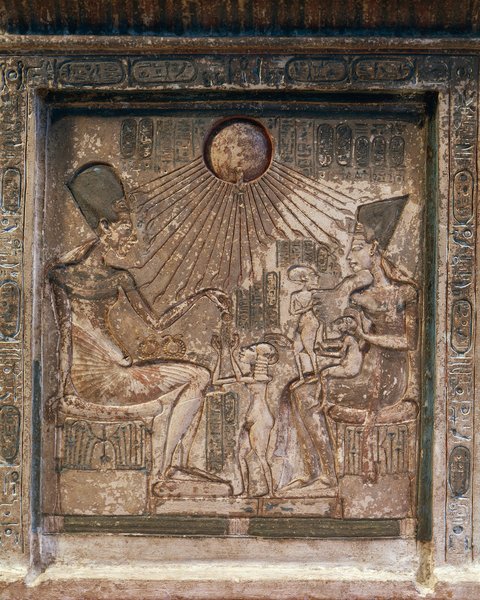The saying, “Like father, like son” is many times referred to as a son who follows his father’s footsteps and who shares similar beliefs and values. However, for Amenhotep III and Amenhotep IV this was quite the contrary. Some scholars argue that Amenhotep IV was many times kept behind closed doors due to his unique physical appearance; and on the other hand, some argue that Amenhotep IV had been serving as an assistant king to his father for an extended amount of time before the crown was officially passed down to him.1 In the fifth month of the year 1353 B.C.E, Pharaoh of Egypt, Amenhotep III, officially handed the throne to his second son Amenhotep IV, after the eldest son died at a young age. After Amenhotep III reigned for thirty-eight years, Amenhotep IV became the tenth king of the eighteenth dynasty. According to scholars, Amenhotep III ruled peacefully. He carried on sacred traditions instilled within Egypt. Amenhotep III made no drastic changes with the power that he was given over the land and his people; nor were there rebellious acts or revolts against traditional views during his reign.2 Amenhotep IV became king during the New Kingdom, Egypt’s most prosperous period.3 This glorious time in Egypt would soon be diminished as Amenhotep IV would struggle to replace the ideas of polytheism (the belief in many gods), which were well practiced and thriving under his father’s reign, with the revolutionary idea of monotheism (the belief in one god). Scholars argue that he initiated a revolution in Egypt in the perspective of religious thinking. Although Amenhotep IV did not create the idea of monotheism, he had a great influence on its spread in Egypt. Because he initiated new ways of religious thinking, Amenhotep IV is characterized as a very impactful African philosopher, not only for his own time, but throughout history. Some argue that his religious thinking did not initiate a revolution, but it endangered the traditional way of life Egyptians conformed to.4

It gradually became apparent that his religious thinking had taken a turn, as he began to replace religious images and symbols of the God Amen with the God Aten in temples and chapels across the land of Egypt. In Amenhotep’s fourth year of reign, he claimed to be “revealed by Aten himself.”5 This revelation led to a number of events, such as the Pharaoh changing his name in the fifth year of his reign. He changed from Amenhotep, Mighty Bull, tall of feathers, to the Aten inspired name Akhenaten, Mighty Bull, beloved of Aten. He not only changed his own given name of Heru (Horus), but he had the names of his wives changed as well.6 Akhenaten not only used his given power to change religion within Egypt, but he made changes to the politics and celebratory traditions as well. For example, the Sed jubilee festival was celebrated by Akhenaten on his third anniversary of becoming Egypt’s ruler. This type of festival, however, was traditionally restricted for the thirtieth regnal year. It is stated by scholars that “to break this tradition meant that the king could break any tradition.”7 Akhenaten was making drastic changes within such a short time of being granted the power of the throne. Further breaking tradition, he moved the capital from Waset to the New Land of Akhenaten. The new capitol was built on a site that had not yet been touched by man, located on the east bank of the Nile. When moving the capital from Waset, Akhenaten did not take along with him the old clergy and those who held an original position of authority, but chose to appoint new authorities within his own personal preferences and likings.
After reigning for seventeen years as a very controversial King, he died in the year of 1336 B.C.E and was succeeded by Tutankhaten, his youngest probable son.8 After Akhenaten’s death, the traditional politics and polytheistic religion were quickly restored and Akhenaten was labeled as a criminal throughout the land of Egypt. According to scholars, the temples in which Aten was praised were abandoned and soon demolished, and Akhenaten’s reign as king was removed from the records.9
Although Akhenaten did not discover monotheism, he has provided us with the greatest example of non-Jewish monotheism in ancient history, and he, indeed, made an everlasting impact on African philosophy and religious thinking.10
- Stephen E. Thompson, “Akhenaten’s Religious Reforms,” Calliope 5, no. 1 (October 9, 1994): 12. ↵
- Henri Frankfort, “Heresy in a Theocratic State,” Journal of the Warburg and Courtauld Institutes 21, no. 3/4 (1958): 152. ↵
- Stephen E. Thompson, “Akhenaten’s Religious Reforms,” Calliope 5, no. 1 (October 9, 1994): 12. ↵
- Molefi Kete Asante and Shaza Ismail, “Akhenaten to Origen: Characteristics of Philosophical Thought in Ancient Africa,” Journal of Black Studies 40, no. 2 (2009): 297. ↵
- Molefi Kete Asante and Shaza Ismail, “Akhenaten to Origen: Characteristics of Philosophical Thought in Ancient Africa,” Journal of Black Studies 40, no. 2 (2009): 299. ↵
- Molefi Kete Asante and Shaza Ismail, “Akhenaten to Origen: Characteristics of Philosophical Thought in Ancient Africa,” Journal of Black Studies 40, no. 2 (2009): 298. ↵
- Molefi Kete Asante and Shaza Ismail, “Akhenaten to Origen: Characteristics of Philosophical Thought in Ancient Africa,” Journal of Black Studies 40, no. 2 (2009): 300. ↵
- Encyclopedia Of African History – Credo Reference, 2004, s.v. “Akhenaten Egyptian Pharaoh,” by Aidan Dodson. ↵
- Stephen E. Thompson, “Akhenaten’s Religious Reforms,” Calliope 5, no. 1 (October 9, 1994): 12. ↵
- David Gange, “Religion and Science in Late Nineteenth-Century British Egyptology,” The Historical Journal 49, no. 4 (2006): 1094. ↵



26 comments
Amanda Gutierrez
Interesting article! I did not know about Akhenaten before your article. I found his story to be intriguing as he strayed away from the typical rulers of Egypt during that time. It was also interesting to read about where the phrase “like father, like son” came from. Overall, this was a very informative and well-written article! Good job!
Averie Mendez
Egyptian history has always been fascinating to me, so I was pleased to find an article on something that I’ve been wanting to learn more about. I feel like Akhenaten was ahead of his time in terms of trying to introduce new ideas to a group of people who weren’t willing to change. I knew that after his death, the Egyptian people quickly reverted back to their old ways. However, I did not know that they wiped away any and every trace of monotheism introduced.
Ryan Estes
I always thought Egypt remained a polytheistic country throughout its history. I never knew the traditional way of Egyptian religious thinking was threatened by Amenhotep IV. It is interesting that he was king during Egypt’s most prosperous period. What would have happened if Amenhotep IV had not introduced the idea of monotheism to Egypt? Maybe countries would have looked at Egypt during its time of prosperity and become polytheistic as well. I guess we will never know what would have happened if this (Amenhotep IV not introducing the idea of monotheism to Egypt) was the case.
Belene Cuellar
It’s interesting to see how different generations can be. This article was written very well and went into detail about the young Amenhotep and how he chose to rule. I wonder what motivated him to make such drastic changes when his father handed over the crown. I would have liked to learn more about his physical appearance and why he was kept hidden.
Kristy Feather
It is really fascinating to see how much a society or civilization can start to change just as one leader does. It is also amazing to see just how different the beliefs between a father and son can be, just because his religious beliefs differed from his father’s, it was a direct lead to the change that would affect the area he led.
Mariah Cavanaugh
Well done! I like how you walked through the transition of power and the changes Amenhotep IV made in a very linear and easy to follow way. I had no idea that ancient Egyptians every practiced monotheism prior to the conversion of Egypt when it was under the rule of the Roman empire. It was interesting to hear that the changes made by this pharaoh were wiped from history. It seems he had grand ideas and moved far too quickly to execute those ideas and did not give the Egyptian people time to adapt to the changes.
Christopher Vasquez
I do not know why Akhenaten would make so many changes so quickly, especially in a society where tradition was critical. The transfer from polytheism to monotheism would most likely have been seen as very negative, which can be seen by the fact that he was virtually erased from history by his people. The desire to leave a legacy is human, and I sympathize with him on this; however, his willingness to do something new jeopardized the peace in Egypt. For instance, it is not uncommon, especially when looking back to ancient times, for there to be religious rebellions because of changes to a people’s practice. To me, it would have been much wiser for Akhenaten to see what he could improve, not what he could change.
Caroline Bush
Interesting article! Its interesting to think about whether Akhenatens religious movement would have actually been beneficial to Egypt in the long run. I also wonder if Akhenatens intentions to change Egypt’s religion was truly because he believed in a monotheists god or he just wanted to upset his father. I really enjoyed the amount of details in this article and how it explained Akhenatens story. Overall this was a very interesting article that I really enjoyed reading.
Vanessa Tombo
Amenhotep IV was a character that the Egyptian world was not ready to have as their leader. He challenged the priest and converted the worshiping of many God to the monotheistic practice. This was the most powerful demonstration of power. Many of his subjects continued to practice in secrecy. This article was incredibly interesting and it allowed readers to view a society that and different from their own.
Brianda Gomez
I have always heard the phrase, “like father, like son”, but I never really knew where it came from. It all goes back to a father passing down his kingdom to his second son. He had a lot of influence in the religious aspects of Egypt. Some of the most greatest examples we know now were thank to Akhenaten. Some people did not think very highly of him and even went to the extent of destroying his temples.